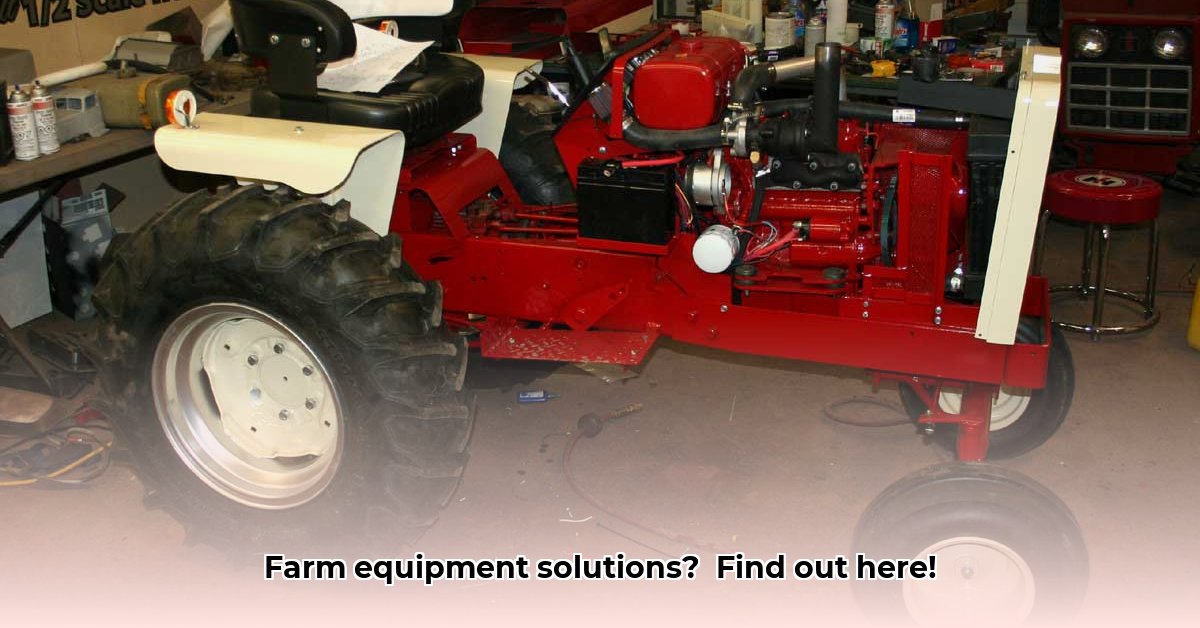
Company Overview: A Southern Illinois Staple
Little Tractor & Equipment (LTE) stands as a prominent agricultural equipment provider in Southern Illinois, serving farmers across a wide region encompassing Harrisburg, Marion, Benton, and Paducah. Unlike large national retailers, LTE distinguishes itself through its commitment to personalized service and deep understanding of local farming practices. Their business model prioritizes building strong customer relationships, offering tailored advice, ensuring timely repairs, and providing convenient access to parts. This localized focus, while presenting certain challenges, also offers a significant competitive advantage in a market often dominated by large, impersonal corporations. Does this personalized approach truly compete with nationwide giants? The case of LTE provides a compelling analysis. For more on agricultural equipment, check out this helpful comparison website.
Competitive Analysis: Navigating a Diverse Landscape
LTE operates within a fiercely competitive landscape. National brands wield significant power, leveraging vast inventories and economies of scale to offer potentially lower prices. However, LTE's strength lies in its intimate knowledge of the local agricultural community. They cultivate long-term relationships, offering expertise tailored to individual farmers’ needs and providing crucial support that goes beyond mere equipment sales. This personalized service acts as a critical differentiator, often outweighing price considerations for farmers prioritizing reliability and trusted guidance. How does LTE’s regional expertise stack up against the immense reach and resources of national competitors? This question warrants careful consideration.
SWOT Analysis: Strengths, Weaknesses, Opportunities, and Threats
LTE's current standing can be understood through the lens of a SWOT analysis, identifying key internal and external factors affecting its trajectory.
| Strengths | Weaknesses | Opportunities | Threats |
|---|---|---|---|
| Exceptional local reputation and strong customer loyalty | Limited online presence and digital marketing | Enhanced digital marketing strategy; Expansion into precision agriculture services | Increasing competition from large national retailers |
| Expert and dedicated staff, deeply familiar with local needs | Limited range of high-end, specialized equipment | Strategic partnerships to broaden product offerings; Development of strong customer loyalty programs | Economic downturns affecting farmer spending power |
| Multiple conveniently located stores, improving accessibility | Lack of readily available market share data | Leveraging sustainability trends to attract environmentally conscious farmers | Supply chain disruptions and parts shortages |
Sustainability Assessment: Embracing Environmental Stewardship
The agricultural sector is undergoing a significant shift towards sustainability. While LTE currently focuses on traditional equipment, embracing sustainable solutions presents a significant opportunity. By incorporating environmentally friendly technologies such as electric tractors or precision farming tools, LTE can attract a growing market segment of environmentally conscious farmers. This proactive approach not only aligns with broader industry trends but also offers a pathway to competitive differentiation. Can LTE capitalize on this growing demand for sustainable practices? A strategic shift in this direction could significantly impact its future success.
Recommendations: A Path to Continued Success
LTE’s future success hinges on a multi-pronged strategy that addresses both short-term and long-term objectives.
Short-Term (0-1 Year):
- Enhance Digital Presence: Develop a user-friendly website featuring detailed product catalogs, high-quality imagery, and compelling customer testimonials. Implement targeted digital marketing strategies to reach a broader audience.
- Customer Relationship Management (CRM): Invest in a CRM system to effectively track customer interactions, preferences, and service history, enabling tailored service and marketing efforts.
Long-Term (3-5 Years):
- Inventory Optimization: Implement robust inventory management software to streamline ordering processes, reduce waste, and optimize stock levels.
- Strategic Partnerships: Forge collaborations with suppliers of sustainable agricultural technologies to expand product offerings and meet growing demand for eco-friendly solutions.
- Targeted Marketing Campaigns: Develop highly targeted marketing campaigns, segmented by customer needs and geographic locations, highlighting LTE’s specialized local expertise and unparalleled customer service.
Conclusion: A Foundation for Future Growth
Little Tractor & Equipment has established a solid foundation in Southern Illinois through a steadfast focus on personal customer relationships. By implementing the strategic recommendations outlined herein, adapting to evolving industry demands, and mitigating potential risks (as detailed in the Risk Assessment section), LTE is poised for continued success and enhanced market competitiveness. Their future growth will depend on maintaining this commitment to customer relationships while embracing sustainable practices and leveraging technological advancements. The future of LTE is bright, but strategic implementation and adaptation are critical to achieving long-term success.